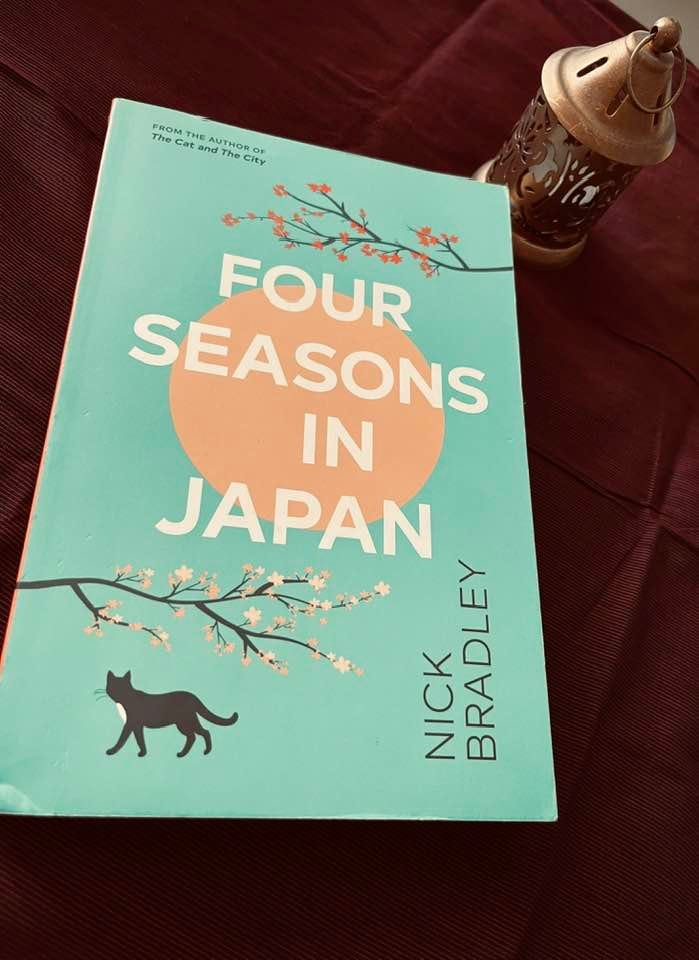This Japanese story embraces Indian roots
From food to cultural motifs, reflect and experience Japanese way of life
Dear Reader,
GOSH, it’s already August. So far, 2024 has been churning out so many surprises - a mixed bag of good ones and not-so-good! Gratitude to the Universe for everything!
Turns out to be quite a packed schedule as I’ve been travelling a lot; it’s been an emotional roller coaster in many ways. We had a beautiful vacation in Vietnam, after which my son moved out to join University; I miss curling up on his arm to read books, watch movies, munch snacks and so on - I’ll talk more about it in my next post.
The tragic loss of many precious lives in Wayanad hurts like a deep wound; the impermanence of life amidst natural calamities confronts us year after year. The sheer inadequacy of institutional safeguards enrages me as I think of the many many children who are orphaned and left forlorn in the wake of such devastating tragedies.
When the world turns threatening in its myriad ways, I find solace in words and books.
And I can’t stop feeling a rush of love for this poignant post by Ava “it’s okay to care too much” because it touched me deeply.
You can love someone intensely, and they can, and might, just brush it off. Even if they feel the same way, they may not respond the way you want them to. That doesn’t make them a bad person. But it also doesn’t make you a bad person.
In today’s world, selfish people win.
Every time.
Often they spew lies to hide their insecurities.
They wring the goodness out of your conscience.
They bleed your heart dry with cruel words.
They fuel other people’s curiosity with gossip.
They make you feel wretched about your life.
But it’s still okay to care about others. Don’t stop.
In other words, here’s one more reason I recommend Japanese fiction - it takes an Indian reader on a heartwarming journey to your deepest and most vulnerable self.
Nick Bradley’s heartwarming novel ‘Four Seasons in Japan’, takes the reader on an intensely poignant journey; a rich tapestry of interconnected lives within families; the yearning of a grandmother for her grandson’s love amidst deep loneliness and the awkwardness of not knowing what to do with it when he begins to respond; the protective armour she uses as a shield when she worries about him stepping out of the safety net of her coffee shop and the unspoken anger smouldering in his young heart.
As a mother battling separation pangs from her son, I find this story brings me closer to everything that is so raw and intense, yet beautiful and deep, about a son who is growing up and leaving home alone to explore his future.
This story sets the context with Flo, a translator in Tokyo who stumbles upon a mysterious book that was left on the subway. It isn’t Flo who caught my interest.
It’s the ‘story within a story’ — you know, that is a tricky terrain. But this is superbly executed and it’s an experience that you have to dive into.
Ayako, a strict grandmother who runs a small cafe and her relationship with Kyo, her grandson who comes from Tokyo, lies at the heart of the book. Deciphering the emotional undercurrents of a young man isn’t an easy cup of tea for Ayako. Their communication is fragmented by a generational chasm that cannot be easily bridged. Words tear them apart, even the most well-intended ones. Conversations turn bitter. Silence works easier in their awkward relationship.
A poignant evocation of Japan and its precious traditions and cultural nuances, the novel takes you through multi-layered characters who pull us deeply into their stories.
Kyo often hypothesized that you wouldn’t be able to lie down in the gutter in one of these rural towns - even if you wanted to - without someone coming over and asking if you were okay within seconds. Kyo had seen Tokyoites walk past people bleeding on the streets. But that would never happen here and Kyo had gradually found a sense of pride growing within himself towards the town.
The beauty, simplicity and profound wisdom of Japanese culture strikes a deep chord.
“But it wasn’t until she moved to Tokyo for work that she realised what she had lost from the smaller community she’d had in Kanazawa. Being in rural Japan had afforded her more opportunities to immerse herself in Japanese language and culture - not many spoke English out in the countryside. She had noticed her Japanese language ability progressing, while friends who lived in the bigger cities stalled, as they clung tightly to their English-speaking circles for a sense of belonging. While translating Sounds of Water, Flo had often found herself nodding in arrangement as Kyo’s experiences of moving from the city to the countryside. They were worlds apart.”
Time has a way of healing fractured relationships; the jigsaw puzzle of their turbulent relationship falls into place as the artist in Kyo seeks harmony within.
Sitting there alone on the mountain, all he had was the present. The past and future didn’t matter. The work was all he had - and therein lay the joy of being.
Several facets of Japanese etiquette add depth to our perspective on how Asian cultures preserve their uniqueness through language and rituals. The protagonist highlights how respect, obedience and family values are integral to the Japanese family, even as the younger generation’s manner of speaking are viewed by the older generation with a need to correct, reform and perhaps indicate a window of opportunity to transform. The thoughtful kindness of strangers adds an alluring aspect to life in Japan’s rural town, as opposed to the touristy ones.
The grandmother-grandson relationship is fraught with unspoken tensions that multiply with every conversation and interaction.
A bitter sweet landscape.
Circling back to few precious takeaways from Ava’s post “it’s okay to care too much”, here’s what stayed with me:
Please don’t numb yourself out because caring is painful. Your capacity for sensitivity and commitment is the best thing about you.
last thoughts from the book
If you are an artist, never give up what you love.
No one can take your art away from you.
Develop inner vision, do not worry about other people’s behavior or reactions.
Do makes you happy, leave the rest to the Universe.
If books are your first and ultimate love, follow @svarasbookshelf on Instagram and feel free to email your book reccos to swapnazanand@gmail.com. I’d love to hear your reviews/insights.
Dear Reader, I’m grateful you read my newsletter.
If you enjoyed reading this, share it with your friends. Thank you for your support!





